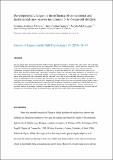Files in this item
Developmental changes in the influence of conventional and instrumental cues on over-imitation in 3- to 6-year-old children
Item metadata
| dc.contributor.author | Moraru, Cristina | |
| dc.contributor.author | Gomez, Juan-Carlos | |
| dc.contributor.author | McGuigan, Nicola | |
| dc.date.accessioned | 2017-07-01T23:45:48Z | |
| dc.date.available | 2017-07-01T23:45:48Z | |
| dc.date.issued | 2016-05 | |
| dc.identifier | 240524381 | |
| dc.identifier | 8884bdba-dd18-4f97-8475-f37f22700fab | |
| dc.identifier | 84953449366 | |
| dc.identifier | 000371560000004 | |
| dc.identifier.citation | Moraru , C , Gomez , J-C & McGuigan , N 2016 , ' Developmental changes in the influence of conventional and instrumental cues on over-imitation in 3- to 6-year-old children ' , Journal of Experimental Child Psychology , vol. 145 , pp. 34-47 . https://doi.org/10.1016/j.jecp.2015.11.017 | en |
| dc.identifier.issn | 0022-0965 | |
| dc.identifier.other | BibCode: NIS240524381 | |
| dc.identifier.other | ORCID: /0000-0002-0218-9834/work/64361098 | |
| dc.identifier.uri | https://hdl.handle.net/10023/11131 | |
| dc.description | This research was funded under the Undergraduate Research Internship Programme (URIP) organized by the University of St Andrews. | en |
| dc.description.abstract | Previous studies have shown that children in the preschool period are fastidious imitators who copy models with such high levels of fidelity that task efficiency may be compromised. This over-imitative tendency, and the pervasive nature of it, has led to many explorations and theoretical interpretations of this behavior, including social, causal, and conventional explanations. In support of the conventional account, recent research has shown that children are more likely to over-imitate when the task is framed using conventional verbal cues than when it is framed using instrumental verbal cues. The aim of the current study was to determine whether 3- to 6-year-old children (N = 185, mean age = 60 months) would over-imitate when presented with instrumental and conventional verbal cues, which varied only minimally and were more directly comparable between instrumental and conventional contexts than those used in previous studies. In addition to varying the overall context, we also varied the instrumental prompt used such that the cues provided ranged in the extent to which they provided explicit instruction to omit the irrelevant actions. Counter to our predictions, and the high levels of over-imitation witnessed in previous studies, the older children frequently over-imitated irrespective of the context provided, whereas the youngest children over-imitated selectively, including the irrelevant actions only when the task was presented in a conventional frame. We propose that the age differences found following an instrumental presentation are a result of the youngest children being more open to the motivation of learning the causality of the task, whereas the older children were more strongly motivated to adopt a social convention. | |
| dc.format.extent | 13 | |
| dc.format.extent | 361797 | |
| dc.language.iso | eng | |
| dc.relation.ispartof | Journal of Experimental Child Psychology | en |
| dc.subject | Over-imitation | en |
| dc.subject | Conventional frame | en |
| dc.subject | Instrumental frame | en |
| dc.subject | Conventional verbal cues | en |
| dc.subject | Instrumental verbal cues | en |
| dc.subject | Social learning | en |
| dc.subject | BF Psychology | en |
| dc.subject | NDAS | en |
| dc.subject.lcc | BF | en |
| dc.title | Developmental changes in the influence of conventional and instrumental cues on over-imitation in 3- to 6-year-old children | en |
| dc.type | Journal article | en |
| dc.contributor.institution | University of St Andrews. School of Psychology and Neuroscience | en |
| dc.contributor.institution | University of St Andrews. Institute of Behavioural and Neural Sciences | en |
| dc.contributor.institution | University of St Andrews. Centre for Social Learning & Cognitive Evolution | en |
| dc.identifier.doi | https://doi.org/10.1016/j.jecp.2015.11.017 | |
| dc.description.status | Peer reviewed | en |
| dc.date.embargoedUntil | 2017-07-01 | |
| dc.identifier.url | http://dx.doi.org/10.1016/j.jecp.2015.11.017 | en |
This item appears in the following Collection(s)
Items in the St Andrews Research Repository are protected by copyright, with all rights reserved, unless otherwise indicated.

